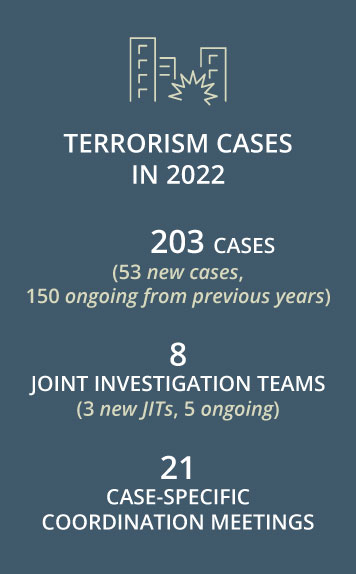
Operational support to terrorism cases
Throughout 2022, Eurojust continued to coordinate and support complex cross-border investigations and prosecutions of terrorist offences in EU Member States. The Agency supported more than double the number of coordination meetings between national judicial authorities on terrorism cases compared to 2021.
Based on the specific needs of each case, Eurojust provided efficient operational and legal assistance to investigations and prosecutions into terrorist attacks, alleged preparation of such attacks, financing of terrorism, recruitment and training to commit terrorist acts, and dissemination of terrorist propaganda.
In addition to terrorist offences, some of these investigations and prosecutions also involved other crimes, including illicit trafficking in arms, ammunition and explosives; crimes against life, limb or personal freedom; drug trafficking; trafficking in human beings; and money laundering.
Slovak and Czech authorities take action against right-wing terrorism

Crime: A 22-year-old is suspected of committing several terrorist and extremist crimes, with the objective of publicly inciting the overthrow of the democratic political system. He shares photos of glorified far-right extremists, and publishes instructions for the production of weapons, explosives and mines, as well as guidelines on how to carry out sabotage attacks.
Action: Two action days take place, supported by Eurojust, Europol, the United States, Slovak and Czech authorities: one on 11 May in Slovakia, where one location is searched, followed by a second on 23 May in the Czech Republic where another location is searched.
Result: During the first action day in Slovakia, one suspect is arrested and a 3D printer, computer and other electronic devices are seized. During the second action day in the Czech Republic, a number of 3D-printed metal parts of weapons are seized.
Eurojust's role: The Agency supported the authorities in Slovakia and the Czech Republic by setting up and funding a JIT into the case. One coordination meeting took place in Slovakia to share information, decide on a common strategy, and facilitate cooperation with the United States and Europol.

The European Judicial Counter-Terrorism Register
Through the Judicial Counter-Terrorism Register (CTR), Eurojust continued to receive a growing amount of information on ongoing and concluded judicial counter-terrorism proceedings from EU Member States. Set up at Eurojust in September 2019, the CTR is a unique operational tool that identifies links between judicial proceedings concerning terrorist offences. When such links are identified, Eurojust helps the national authorities of the affected EU Member States to discuss and agree on the necessary follow-up, and make use of the coordination tools offered by Eurojust. Through Eurojust, the CTR has triggered international cooperation and coordination that has led to successful prosecutions and convictions.
However, the sharing of information on judicial counter-terrorism proceedings and the Eurojust case-management system needs to be further enhanced. Eurojust supported the EU institutions throughout the negotiation of the proposal to amend the Eurojust Regulation as regards the digital information exchange in terrorism cases. The proposal aims at rendering the exchange of information between the national competent authorities, Eurojust and the CTR more efficient.
The Agency provided input concerning the operational benefits and concrete results achieved by the CTR’s implementation so far, as well as technical input on the proposed IT solutions. The co-legislators reached a provisional agreement in December 2022 which will: enhance Eurojust’s capacity to detect links between judicial terrorism cases; create a modern case management system (CMS) to store operational information and a secure digital communication channel between Member States and Eurojust; and simplify cooperation with third countries by granting liaison prosecutors seconded to Eurojust access to the CMS. The amendments are expected to be adopted in the course of 2023.
The 2022 Eurojust Meeting on Counter-Terrorism
The 2022 Eurojust Meeting on Counter-Terrorism brought together national correspondents for Eurojust for terrorism matters, specialised prosecutors from both EU Member States and partner third countries, as well as representatives from EU institutions and agencies, and international organisations. The meeting focused on operational experience with cases opened on the basis of information transmitted via the European Judicial Counter-Terrorism Register, cross-border investigations into the financing of terrorism, the impact of migrant smuggling on terrorism and various legal challenges in counter-terrorism proceedings. The main conclusions from these topics discussed are summarised below:
The CTR - Eurojust’s CTR is considered to be a crucial tool to identify links between judicial counter-terrorism proceedings in Member States, and has already proven its operational benefits. The proposed amendments to the Eurojust Regulation will improve the CTR by bringing clarity as to the obligation of Member States to transmit information to Eurojust, the categories of data to be transmitted, the rules on data retention and the access to the Eurojust CMS at national level.
Terrorism financing cases - In recent terrorism financing cases, mixed money transfer channels or methods have been used, shifting from regular money transfer providers to hawala, cryptocurrencies or PayPal. Therefore, the activation of international cooperation is extremely important in ensuring successful results in such cases.
The impact of migrant smuggling on terrorism - The risk of possible exploitation of migration flows by members of terrorist groups and foreign terrorist fighters to attempt to enter the European Union undetected still exists. There is no evidence of terrorists using mixed migration flows systematically to move across the borders. However, people suspected of being linked to terrorism had been identified as travelling to and through the European Union using the services of criminal migrant trafficking networks.
Battlefield evidence in terrorism and core international crime cases - Battlefield evidence is used effectively in terrorism cases and in cases in which terrorism and core international crimes are charged cumulatively. Increased use of battlefield evidence is considered essential and the work of Eurojust and the European Network for investigation and prosecution of genocide, crimes against humanity and war crimes on this subject matter remains important, also in light of the war in Ukraine.
Hate crime and hate speech
In April 2022, Eurojust hosted the French EU Presidency seminar on justice and internal security –‘Europe that protects’. One key round table was dedicated to the fight against online hate speech. The panellists presented the actions taken by Member States in this area, as well as the existing cooperation between judicial and law enforcement national authorities and dedicated EU agencies. Eurojust’s activities in supporting national authorities in their investigations and prosecutions of hate crime and hate speech were also presented.
In 2022, Eurojust expressed its interest to become further involved in the activities steered by the European Commission to combat hate speech and hate crimes by joining the dedicated working groups on reporting and data collection, hate speech online and victim support.
